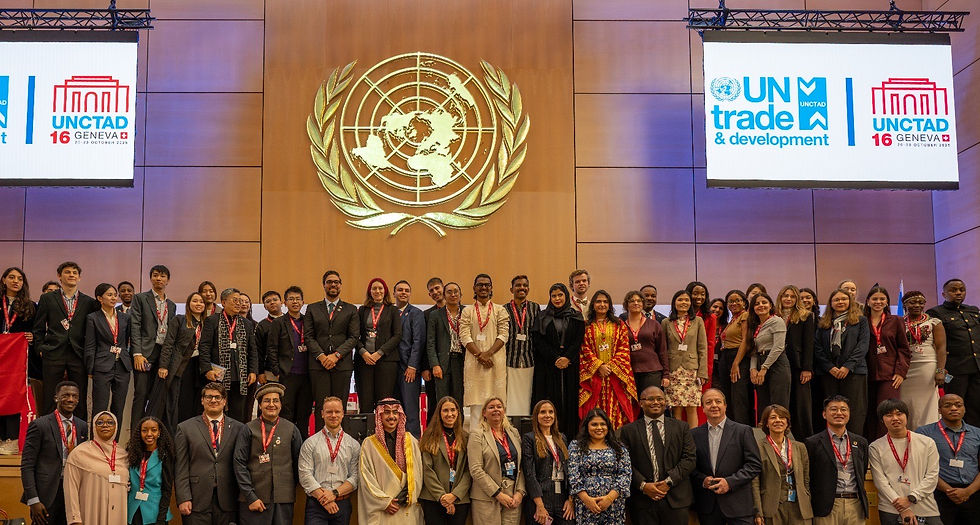UNCTAD Reflections: The Future of Trade is Taught in SchoolS
- SDSN Youth

- Nov 10, 2025
- 3 min read
Written by Stacy Nyathi, Global Schools Project Lead, Communications

From October 19 to 23, 2025, on behalf of the Global Schools Program, I joined more than 150 young people at the 5th United Nations Conference on Trade and Development (UNCTAD) Youth Forum in Geneva, Switzerland.
The theme for this year’s conference was “Shaping the Future: Driving Economic Transformation for Equitable, Inclusive and Sustainable Development,” which has never been more relevant for young people. Over four days, the delegation explored various discussions on trade and development in different contexts, from the rapid digital transformation to climate change and fostering entrepreneurship.
I arrived with many expectations, especially given the sobering reality of the slow progress in implementing the Sustainable Development Goals (SDGs). At the 2021 UNCTAD conference, a powerful declaration was made: “Development must progress against all odds.” Countries must pull together and harness trade, finance, investment, and technology to achieve the SDGs. Yet, the Sustainable Development Solutions Network (SDSN) 2025 Sustainable Development Report indicates that only 16,7% of the SDGs will be met by 2030.
The Role of Education in Empowering Youth
As the discussions unfolded, one undeniable truth repeatedly emerged as the foundation for achieving every objective outlined by UNCTAD and the broader SDG framework: education. Access to quality education remains a key factor in successful trade and development.
In every panel, working group, and networking conversation, the underlying need for knowledge, skills, and values to tackle 21st-century challenges was the connecting thread, whether the topic was economic instability, climate resilience, youth entrepreneurship, or financing.

This led to a critical examination of the current education system. Experts and youth voiced concerns about outdated curricula, particularly in the Global South, stressing that the future of work demands a significant shift in the preparation of learners. One of the panelists Anderson Yu, an EdTech expert, noted that:
"We are using knowledge of the past to teach students of the present and preparing them for the future."
Future Skills Academy’s Mohammed Bin Rashid Al Maktoum highlighted that youth no longer have linear career paths, compounded by a crisis of unemployment and the relevance of current curricula. To meet this challenge, young people need continuous reskilling and upskilling. The conversation quickly pivoted from what skills are needed to how they can be developed. A core sentiment, powerfully captured by panelist Abdulkarim Bihaki, was the need for genuine partnership between youth and other stakeholders:
"We don’t need any more programs designed for youth. We need more opportunities to co-create programs for youth."
Awareness Begins Early

Youth delegates also shared their experiences leading companies, defying odds, and contributing to trade and economic development in their countries.
What impressed me the most was the number of high school students engaging in conference discussions.
In speaking to them, I was inspired by the level of awareness and initiative that such young learners have. The ability to link global issues like trade policy and climate action directly back to their lives and local realities is a clear outcome of a strong Education for Sustainable Development (ESD) foundation. They don't just know the SDGs; they are applying them. They are also accessing spaces where they can voice their perspectives as well.
This directly aligns with the Global Schools Program's mission to ensure every primary and secondary student is equipped with the knowledge, skills, and values to build resilient and prosperous communities. The presence of young learners at the Youth Forum was proof that when you educate youth about the SDGs early, they can start contributing sooner. That will certainly help us meet the Agenda 2030 targets while incorporating a greater youth perspective.
What’s Next after the Youth Forum?

The UNCTAD Youth Forum was more than just a place for dialogue; it was a platform for young people to influence policy. The discussions were collated to create a Youth Declaration, and our collective message was clear: Investing in young people is the most critical investment for sustainable economic transformation. One sure avenue of investing in young people is by investing in their education.
To accelerate progress towards the 2030 deadline for the SDGs, we must prioritize SDG Target 4.7, integrating sustainable development and global citizenship into education at all levels. This means:
Empowering Teachers: Providing educators with the training and resources to teach sustainability in a dynamic, interdisciplinary way.
Reforming Curriculum: Making climate action, financial literacy, and ethical trade principles core components of what every student learns.
Supporting Youth-Led Initiatives: Creating enabling environments that celebrate and facilitate the innovative, entrepreneurial, and advocacy spirit we saw on display in Geneva.
The young people at UNCTAD are ready to lead in trade and development. Now, the world's education systems must adequately prepare them for the job.

















During overtime in Retro Bowl College, my backup running back carried the ball on every play and powered in the winning touchdown despite low stamina.